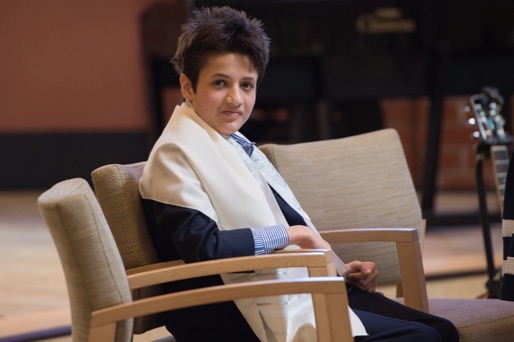
by Dorrit Corwin
A Wordless Bar Mitzvah That Was Far From Silent

This article was originally published on Jewish Women, Amplified, the blog of the Jewish Women’s Archive, and was written as part of the Rising Voices Fellowship.
Over the years, I’ve been to countless bar and bat mitzvah ceremonies. While each one has been unique to the specific teen being honored, all of the services have catered to the typical Jewish kid: one who can read English and some Hebrew, memorize prayers, and stand at the bimah and speak about his or her Jewish education and life experiences. In February, I had the honor of being part of a bar mitzvah that was unlike any of the others I had previously attended. My family friend Max became a bar mitzvah without speaking a single word.
Max has no official diagnosis, but he’s lived 13 years as a nonverbal boy with very limited mobility. His mom, Jody, is a superhero. She’s been his biggest cheerleader since the day he was born and has always believed in him. After hundreds of visits with doctors, several major surgeries, and intense physical therapy, Max has gained the ability to walk on his own, though it’s still not easy. He led his bar mitzvah service from a chair on the bimah and, again, without any words.
Max captivated the room with just his eyes, which glimmered with light and reacted differently to each part of the service. Max is learning sign language, but Jody says he mostly speaks with his eyes. I agree. The smile on his face lit up the entire sanctuary with palpable feelings of love and appreciation. His joy is infectious, and it’s obvious that he has an incredibly kind soul.
Many people asked Jody why she insisted on going through so much work to create this non-traditional service to honor Max. Since she doesn’t believe he’ll ever get married or formally be celebrated as a Jew at any other time during his life, she wanted to create an opportunity for him to be acknowledged by his Jewish community, surrounded by his family and friends. According to Jewish law a boy becomes a bar mitzvah, a man in the eyes of Jewish tradition, at age 13; nowhere does it state that children with special needs are excluded or exempt from this rite of passage.
It bears noting what an incredible mother and woman Jody is. She has pretty much raised Max as a single mother, with help from her own wonderful mother, Maxine, and support from her sister Carrie. Jody has been a gleaming example of a strong Jewish woman ever since I’ve known her. Hearing about her unwavering dedication to Max is truly inspiring. From their hour-long car rides to physical therapy to the re-configuration of their home to accommodate Max’s needs, there is truly nothing Jody wouldn’t do to put a smile on his face and make their lives just a little bit brighter. Watching her savor every moment with Max has taught me not to take anything I have for granted–especially the fearlessly loyal women in my life like Jody.
Jody and I are blessed to be members of a Reform synagogue that makes dreams like these become realities. When she approached our rabbi and cantor about her idea, they said that they’d absolutely find a way to make it happen. It became an “all hands on deck” kind of service, in which various cousins, relatives, and friends pitched in to read from the Torah, recite prayers, and share blessings with Max and with the congregation.
I’ve never witnessed such a moving and meaningful transition from childhood to Jewish adulthood. I was honored to sing a duet with my sister during the ceremony. It was something we’ve sung together at multiple services, but it took on new meaning as I watched Max react to the music. He might not have known the true meaning of “Adon Olam,” but the energy filling the room was palpable enough for him to know it meant something celebratory and unifying. It was extremely powerful to look out at a crowd and know that each person was there to support Jody and celebrate her incredible son. It’s one thing to know that it takes a village, but it’s an entirely different and much more meaningful experience to see the entire village in front of you with outstretched arms and open hearts.
Dorrit Corwin is a junior at Marlborough School in Los Angeles, California, where she explores her passions for writing, foreign languages, philanthropy, feminism, and singing. At her temple, she enjoys leading her congregation in prayer as a junior cantor. In her free time she watches sitcoms, eats an abundance of avocados, attends concerts with friends, and takes photographs to commemorate her travels as well as her everyday life.
